[Ministry of Foreign Affairs of Japan] [Wednesday, May 13, 2015]
Japan-Belgium Summit Meeting
On May 13, commencing at 6:00 p.m. for approximately 45 minutes, Prime Minister Shinzo Abe held a summit meeting with H. E. Mr. Charles Michel, Prime Minister of the Kingdom of Belgium, who was visiting Japan. The overview is as follows.
1. Beginning
Prime Minister Abe welcomed Prime Minister Michel to Japan, and stated that the fact that the mutual prime ministerial visits was achieved in a period of approximately one year following Prime Minister Abe’s visit to Belgium in May last year is a testimony to the close relationship between the two countries. In response, Prime Minister Michel expressed his gratitude for the hospitality shown by Japan and Prime Minister Abe, and explained that this trip is his first bilateral trip outside the European Union since his appointment in fall last year, and this demonstrates that the relationship between the two countries has a long history, and that is strong and fruitful.
The two leaders noted that between the two countries, there is close exchange between the Imperial Family and Royal Family, and confirmed that this visit to Japan will be an opportunity to further strengthen bilateral relations in the run up to the 150th anniversary of the establishment of diplomatic relations between Japan and Belgium next year, and that they will also work together to deal with the common challenges of the international community.
2. Bilateral relations, Japan-EU relations
(1) Prime Minister Abe mentioned that an investment seminar had been held successfully at the Japan External Trade Organization (JETRO) on May 12, and welcomed that cooperation between the two countries’ companies is making concrete progress. In response, Prime Minister Michel explained that in light of the success of this investment seminar, he intends to hold an investment seminar in Brussels next year, and will be grateful if Prime Minister Abe would attend also. Prime Minister Abe expressed his thanks for the invitation. The two leaders confirmed they will continue to engage in advancing and strengthening economic relations between the two countries.
(2) Prime Minister Abe explained that he hopes to further strengthen the two countries’ people-to-people exchanges, including through the early introduction of a working holiday program and supporting participation by young people from Japan at the “Second French Language World Forum (2ème Forum mondial de la langue française)”, which is scheduled to be held in Liège, Belgium in July this year. Prime Minister Michel expressed his approval.
(3) Prime Minister Abe expressed his hope to cooperate on reaching an agreement in principle on the Japan-EU Economic Partnership Agreement (EPA) this year and promptly concluding the Japan-EU Strategic Partnership Agreement (SPA), and he also requested that the EU’s restrictions on importing items produced in Fukushima Prefecture be abolished or eased. Prime Minister Michel replied that the Government of Belgium also supports the Japan-EU EPA, and intends to participate fully in the negociations.
3. Politics and security
(1) Prime Minister Abe stated that he highly appreciates the proactive role that Belgium is playing in areas such as counter-terrorism, anti-piracy measures and peacebuilding support, and explained the development of seamless peace and security legislation under Japan’s proactive contribution to peace policy. In response, Prime Minister Michel mentioned the cooperation with the North Atlantic Treaty Organization (NATO) and the EU, and stated that he is interested in Japan’s efforts and is watching them closely.
(2) Both leaders shared the recognition of the need of the early realization of United Nations (UN) Security Council reform early, given that this year marks the 70th anniversary of the founding of the UN. Additionally, the two leaders shared the view that it is necessary for the international community to cooperate on responding to terrorism and radicalism, and confirmed that they will continue to cooperate on utilizing passenger name records (PNRs), in light of advancing international counter-terrorism.
4. Other
The two leaders explained their respective economic policies, and also exchanged views on regional affairs, including East Asia, and Ukraine and Russia.
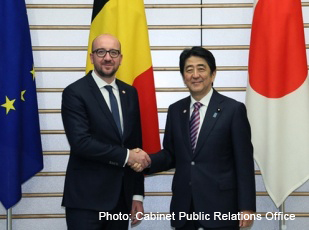
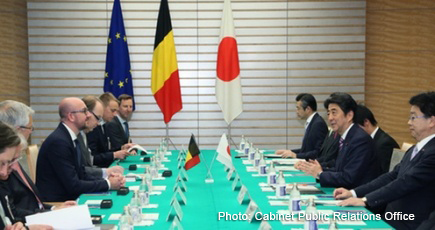
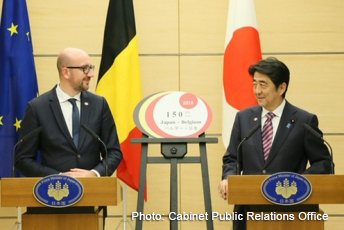
[ Japan International Cooperation Agency] [Monday, May 11, 2015]
JICA Dispatches Second Medical Team to Nepal Following Earthquake
The Japan International Cooperation Agency dispatched a second Medical Team to Nepal upon an order from the Japanese minister of Foreign Affairs in response to a request from the Government of Nepal, following a 7.8 magnitude earthquake.
The earthquake struck Nepal with the epicenter in Lamjung District, located about 80 km northwest of Kathmandu, at 11:56 a.m. local time (3:11 p.m. Japan time) on April 25, and caused extensive damage.
As of May 4, 7,365 people had been confirmed dead and 14,355 had been injured. Thirty-nine districts out of 75 had been affected. Some 191,000 houses had been destroyed and 175,162 houses had been partly damaged. More than 8 million people had been affected.
In response to a request from the Government of Nepal, JICA dispatched a medical team on April 28. Soon after its arrival, the team supported operations at a hospital in Kathmandu. And then, upon request from the Government of Nepal, the medical team deployed an open air hospital in Barhabise village in Sindhupalchowk County located northeast of Kathmandu, where medical needs are high. The team has diagnosed around 100 affected people per day and performed operations.
Since it was obvious that there were lots of needs for medical care, dispatch of the second medical team was decided, which succeeds the first team‘s operation.
The second team consists of 34 members: the team leader (doctor), two deputy team leaders (from the Ministry of Foreign Affairs and JICA), five doctors, 12 nurses, one clinical technologist, one radiological technologist, two pharmacists, one clinical engineer, four medical logisticians and five operational logisticians.
The team departed from Japan on May 7 and arrived in Kathmandu via Bangkok on May 8. The duration of its deployment will be two weeks. Meanwhile, the duration of disaster relief activity as a whole is being considered in view of local needs.
Besides dispatching medical teams, JICA also has dispatched a Search and Rescue Team on April 26 in response to a request from the Government of Nepal and provided emergency supplies (including tents and blankets) with a total value of US$210,000.
[Japan International Cooperation Agency] [Tuesday, May 12, 2015]
Search and Rescue Team and Medical Team 1st Batch Return from Earthquake-Stricken Nepal
The 7.8 magnitude earthquake that struck Nepal on April 25 caused extensive damage over a wide area, including the capital city of Kathmandu. The Japan International Cooperation Agency dispatched a Search and Rescue Team (1) and two medical teams to Nepal upon an order from the Japanese minister of Foreign Affairs in response to a request from the Government of Nepal.
The Search and Rescue Team, consisting of 70 members, departed from Japan on April 26 and arrived in Kathmandu on April 28. The team started its activities at the Krishna Mandir temple near the former royal palace in Hanuman Dhoka, Kathmandu. And then the Japanese Search and Rescue Team was asked at international coordination meetings to work in an area called Sector K in the ancient city of Bhaktapur. The team tirelessly conducted its search and rescue activities there.
The contribution of the Japanese Search and Rescue Team was highly acclaimed by the government and people of Nepal.
The Japanese Search and Rescue Team concluded its activities in Nepal on May 7, departed from Nepal on May 8 and returned to Japan safely on May 9.
As for the medical team 1st batch, the team dispatched was able to not only make basic diagnoses and give basic treatment, but also to fulfill advanced medical needs, including surgical operations and dialysis. It was the first time Japan dispatched a team capable of advanced medical function.
The team, consisting of 46 members, departed from Japan on April 28 and arrived in Nepal on April 29. Soon after its arrival, the team supported operations at a hospital in Kathmandu. And then, the medical team established a field clinic with advanced medical functions in an extensively damaged area, Barhabise village in Sindhupalchowk County, located northeast of Kathmandu (approximately three hours by car), and diagnosed affected people there.
The medical team 1st batch diagnosed 645 affected people in total by May 8 (follow up patients included), and performed eight operations.
After handing over its operations to the medical team 2nd batch that arrived in Kathmandu on May 8, the medical team 1st batch departed from Nepal on May 10 and returned to Japan safely on May 11.
The medical team 2nd batch (2) departed from Japan on May 7 and arrived in Kathmandu on May 8. The second batch team took over for the first batch team.
Notes:
1. A Japan Disaster Relief Search and Rescue Team called USAR (Urban Search and Rescue) is a search and rescue team that responds to urban-type disasters. The team specializes in rescuing injured people under such debris as buildings that have collapsed in disasters including earthquakes.
2. The medical team 2nd Batch and Japan Self-Defense Force Units dispatched as a Japan Disaster Relief (JDR) Team for medical assistance continues its activities in Nepal.
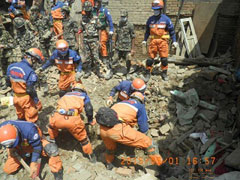
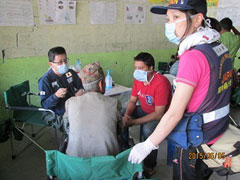
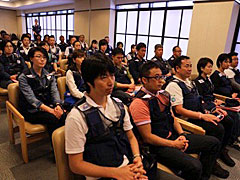
[Ministry of Foreign Affairs of Japan] [Wednesday, May 13, 2015]
Emergency Grant Aid to Nepal for the Earthquake Damage
1. On Tuesday, May 12, the Government of Japan decided to implement the Emergency Grant Aid amounting to 14 million US dollars to support the Government of Nepal, which was announced in light of the massive damage caused by the earthquake occurred on April 25, through 8 international organizations and others.
2. In this aid, humanitarian emergency assistance such as food, emergency medical care, shelter, health, and water and sanitation is to be provided to the most affected areas such as Sindhupalchowk, through World Food Programme (WFP), International Federation of Red Cross and Red Crescent Societies (IFRC), and United Nations Children’s Fund (UNICEF) and others. This aid will also include assistance for early recovery of Nepal through United Nations Development Programme (UNDP) and others.
3. The Government of Japan will implement this aid swiftly and intends to continue to provide effective assistance to the extent possible in a seamless manner including in the stages of recovery and reconstruction of Nepal.
(Reference) Japan’s assistance in response to the earthquake damage in Nepal
(i) Dispatch of Japan Disaster Relief (JDR) Team
Urban Search and Rescue Team (Concluded its mission)
Medical Team (Operating in Sindhupalchowk)
Japan Self-Defense Force Units (Operating in Kathmandu city)
(ii) Emergency relief goods (blankets and tents)
[ Ministry of Foreign Affairs of Japan] [Wednesday, May 6, 2015]
Dispatch of a Self-Defense Forces member to the Ethiopian International Peace Keeping Training Centre (EIPKTC)
1. The Government of Japan decided to dispatch a member of the Japan Self-Defense Forces (Lieutenant Colonel Norihisa Urakami) to the Ethiopian International Peace Keeping Training Centre (EIPKTC) for the period from May 19 until June 15 as international consultant for a conflict management course to be implemented by the EIPKTC.
2. Based on the recognition that peace is a prerequisite for development, the Government of Japan has been providing assistance to peacekeeping operations (PKO) training centers in Africa, with a view to enhancing the peacekeeping capabilities of African countries and maintaining the stability of the region. The dispatch of this JSDF member is part of Japan’s support for the EIPKTC, one of the PKO training centers in Africa. The Government of Japan will continue to provide meaningful assistance towards peace and stability in Africa not only on the financial front, but also by drawing upon Japan’s qualified human resources.
(Reference 1) Japan’s support for PKO training centers in Africa
Since 2008 the Government of Japan has provided support worth more than 39 million U.S. dollars to 13 PKO training centers in Africa (Egypt, Mali, Ghana, Nigeria, Benin, Togo, Cameroon, Ethiopia (two locations), Rwanda, Kenya, Tanzania and South Africa). Japan’s assistance has been directed to the rehabilitation of facilities, the supply of equipment and the design and implementation of various trainings, among others. Where the dispatch of personnel is concerned, 36 Japanese experts were sent as lecturer and/or consultant to 8 PKO training centers in Africa, which includes two Japan Self-Defense Forces members sent last year to the EIPKTC.
(Reference 2) Japan’s support for EIPKTC
The EIPKTC was established in 2013, with the goal of enhancing capacities for peacekeeping activities in the region, under the control of the Ministry of National Defense of Ethiopia. It offers training in various fields such as disarmament, security sector reform, small arms and election-monitoring, to Ethiopian and foreign personnel including those from the Eastern Africa Standby Force (EASF) and the African Union (AU). The Government of Japan has provided the EIPKTC with 940,000 U.S. dollars via the Japan-UNDP Partnership Fund to construct a lecture theatre and to develop conflict prevention, conflict management and post-conflict reconstruction courses.